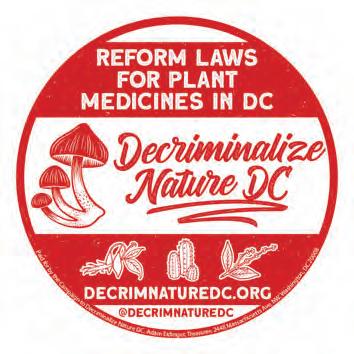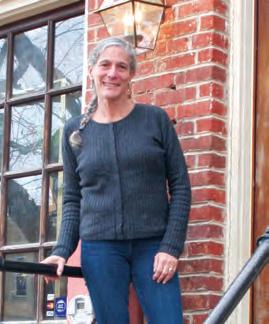
6 minute read
Using Psychedelic Plants as Medicine: A New Solution for Mental Health Disorders
Using Psychedelic Plants as Medicine
A New Solution for Mental Health Disorders
by Pattie Cinelli
In 2017, Melissa Lavasani and Daniel Conner were about to have their second child. Towards the end of her pregnancy Melissa started to have severe depression. “Instead of taking medication prescribed by my physician I chose to tough it out. Unfortunately it got worse after birth. I could barely function. I still did not want to take pharmaceuticals.”
Lavasani chose a di erent path to healing. The couple secretly grew their own magic mushrooms in their closet. Her husband Daniel Conner grew up knowing about mushrooms. He became the cultivator, grower and doser for his wife. Lavasani micro-dosed her way to feeling better. “It was as if I was blind and deaf and could see colors and hear again. The quality of my life vastly improved.”
It’s estimated that 10 percent of women struggle with postpartum anxiety or depression. Other studies have suggested that number may be even higher at 20 percent to 25 percent, according to Hu ngton Post.
Lavasani said micro-dosing psilocybin enables one to get the bene ts of the plant’s healing properties without hallucinating. She said she started with a very small dose each morning but took days o so she would not build up a tolerance. “I liken a day of micro-dosing to what I consider my ideal morning routine,” explained Lavasani. “A solid eight hours of sleep with a morning workout, shower and a good breakfast. It feels like you are well rested and ready to troubleshoot your day. There is no ’trip’ experience with a micro-dose. It’s more of a feeling of empowerment than anything. You feel in control of your emotions and your body.”
Lavasani and her husband are both well educated, both working in DC government jobs, the parents of young children – not the type of couple one might imagine looking to psychedelics as medicine. When a friend suggested she listen to an episode of the Joe Rogan Experience that featured the mycologist Paul Stamets speaking about the bene ts of psilocybin mushrooms on mental health, Lavasani was quoted in a “Washingtonian” article (July 2020) as saying, “I assumed people that took psychedelics were people that were trying to escape their reality, that couldn’t deal with adulthood. But these weren’t normal times.” Lavasani got involved with plant medicine advocacy after treating her depression with psilocybin and ayahuasca. She wanted to share her experience with others and wanted to nd a way that others could bene t from her knowledge without the secrecy she had to adhere to and the fear she felt of being ‘discovered’ and even possibly losing her job. In November 2020 she launched Initiative 81 on the DC ballot. “It won by 76 percent which is the biggest margin for any DC initiative in its history,” said Lavasani.
out hallucinating. She said she started with a very small dose each morning but took days ence with a micro-dose. It’s more of a feeling of empowerment than anything. You feel in control of your emotions and your body.” Melissa Lavasani and Daniel Cnner with their children Lola, 6, and Ramsey, 3.

Entheogenic Plant and Fungus Policy Act Fungus Policy Act
The Initiative did not legalize or decriminalize. Instead it shifts decriminalize. Instead it shifts enforcement of laws against natural plant medicines or entheogens to be among the lowest law enforcement priorities. An entheogen is a natural plant or fungi substance that initiates nonordinary states of consciousness which can inspire cognitive emowhich can inspire cognitive emotional, relational and spiritual growth tional, relational and spiritual growth and healing. An entheogen includes psiloand healing. An entheogen includes psilocybin-containing “magic mushrooms,” mescalinecontaining cacti, iboga-containing plants, and/or DMTcontaining plants and preparations such as ayahuasca.
The passage of the initiative is just the beginning. Lavasani is working with the DC government to ensure proper implementation of the Act. “We want to educate by sharing our story. We also want to keep people safe,” she said. “We are working with the DC Metropolitan Police on implementation. We also want a worker/child protection bill to protect anyone who gets arrested with plant medicines from losing their children or their job.”
The Plant Medicine Coalition
In January 2021 Lavasani founded and became the executive director of the Plant Medicine Coalition, whose mission is to “create, protect and promote safe, equitable access to natural and synthetic psychedelic and plant medicines through local and national advocacy.” Lavasani is working with other jurisdictions as well. “We are helping them develop a legislative strategy and learn how to talk to elected o cials,” she said.
One of Lavasani’s goal through The Plant Medicine Coalition is to foster pragmatic, diverse conversations at the local, state and federal levels. She wants to advance public policies that integrate psychedelic and plantbased therapies into societal frameworks. Lavasani’s coalition emphasizes science and evidence-based research and hopes her focus will change the way lawmakers view
psychedelic and plant medicines.
She also is working on building up community hubs in every ward in the city. Earlier this year The Coalition offered a community grants program for individuals and groups in DC that seek funding for plant medicine education resources and opportunities that may include, but are not limited to, funding for curriculum building, community educational/training, documentaries or howto guides. Lavasani said about 70 people showed up to learn about the grant education program.
Universities in the U.S. are receiving a legal dispensation to use the federally-banned plants in research projects to test their e cacy for PTSD, depression and addictions. Johns Hopkins University is leading the way in the U.S. Studies are also being conducted in the Imperial College in London, The University of Basel and the University of Zurich. Lavasani said that Brazil is giving ayahausca to prisoners to help reform them.
According to “Spirituality & Health” magazine, for thousands of years, people have used psilocybin mushrooms for spiritual journeys and various kinds of healing. Why? It’s powerful, but not addictive. Last year Oregon made the therapy legal for PTSD. What is old is becoming new again.
When I googled books about magic mushrooms, there were no less than 20 ranging from the bible of psychedelics published in 1964 co-authored by Timothy Leary, Ralph Metzner and Richard Alpert (Ram Das), The Psychedelic Experience, to a more contemporary book published in 2018 called, How to Change Your Mind by Michael Pollan (author of The Omnivore’s Dilemma).
To nd out more about The Plant Medicine Coalition log onto: plantmedicinecoalition.org. To contact Lavasani email her at: melissa@plantmedicinecoalition.org.
Pattie Cinelli is a health and tness professional and journalist who has been writing her column for more than 20 years. She focuses on holistic and non-mainstream ways to stay healthy and get well. Please email her with questions or column suggestions at: tmiss44@aol.com. ◆

Serving Capitol Hill since 1984 Custom designed mats • Wide selection • Work done on premises
513 11TH ST. SE (EASTERN MARKET METRO) 202.544.7577 www.newmangallery.com







